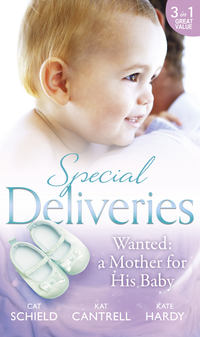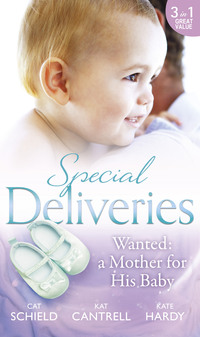
Полная версия
Their Very Special Marriage
Ginny’s comment had only been about Oliver’s workaholic habits. Hadn’t it?
All the same, Rachel couldn’t help noticing how many of the signs applied. Seven out of ten. Which she’d blamed on work.
A sexually, emotionally or physically absent partner is likely to be getting fulfilment somewhere else.
No, no and no. She was just being paranoid. Stupid. It was only an article in a magazine. It didn’t mean that Oliver was having an affair. She closed the magazine and dunked it in the bath. ‘So there,’ she said.
But there was an empty feeling in her heart as she climbed out and dried herself. And an even emptier feeling as she went to bed. Alone.
CHAPTER TWO
OLIVER blinked hard. His eyes were sore from the time he’d spent at the computer. But every time he’d thought about stopping, he’d heard his father’s voice. I’m relying on you, son. Keep the practice going, just as I would.
How could he let his father down? Nigel had dropped out of medicine after the third year, which had left Oliver as the one who had to keep the family practice going. Sometimes, just sometimes, Oliver wished his elder brother would shoulder his share of the family responsibilities. But he was realistic enough to know Nigel never would, and their mother would always have a ready excuse for him. Which left Oliver to carry the burden on his own.
The house was completely silent. Oliver couldn’t even hear Squeak, the family hamster, running on his wheel. With a sigh he checked that the doors were locked, and trudged upstairs to the bedroom. Rachel’s bedside light was still on, but she was asleep.
It was barely half past ten.
Couldn’t she have waited up for him for once? She knew how busy he was, that he had to put the hours in at his desk at home. He was senior partner at the practice. He had responsibilities, to his patients as well as to his family. But Rachel always seemed to have an early night nowadays. Leaving him to unwind on his own in front of the news, sport or a film he didn’t really want to see.
He stripped and had a shower, half hoping that the sound of the water would wake her. Maybe she’d surprise him, open the shower door and slide in next to him, and...
Oh, who was he trying to kid? He couldn’t remember the last time they’d made love. Every time he made an overture, she gave him that apologetic little smile. ‘Sorry, love. I’m a bit tired. Maybe tomorrow night?’
And tomorrow never came.
So, lately, he’d stopped even asking. There wasn’t any point.
OK, to be fair, Rachel worked long hours, too. She did her shifts at the surgery, kept the house running, looked after the children. Oliver was guiltily aware that he didn’t do as much as he should on the parenting front, that he’d used work to duck his responsibilities at home. But Rachel was so much better at that sort of thing than he was. She always knew how to make things right when the kids were upset.
He just wished she could make him feel better.
His mouth tightened as he towelled himself dry. And what had that been about earlier this evening? We need to talk. About us. Was she...?
No, of course not. They were all right. It was just a phase that most couples with small kids went through. He’d seen enough of them in his surgery, women tired out by child care and feeling neglected by their spouses.
Maybe he’d buy Rachel some flowers tomorrow. Show her he appreciated her. And then maybe she’d show him some appreciation, too. And if she didn’t appreciate him...well, at least there was one person who did. One person he could talk to. And maybe she could shed some light on what was going on in Rachel’s head.
* * *
Rachel was already up the next morning when Oliver woke. He could hear her in the bathroom, cleaning Sophie’s teeth and encouraging Robin to clean his. By the time Oliver had showered, dressed and gone downstairs, the children were ready for school and Rachel had set a cafetière of coffee next to his place at the kitchen table.
‘See you at the surgery,’ she said. ‘Soph, Rob, give Daddy a kiss goodbye.’
‘Love you, Daddy,’ they both said.
Oliver hugged them back. ‘Love you, too. Have a nice day at school.’
‘Nursery, Daddy,’ Sophie corrected him. ‘I’m going to big school next year.’
He couldn’t help grinning. His daughter was so pedantic. But she had her mother’s smile, wide and welcoming, enough to charm anyone. And that cute little lisp meant she could get away with murder. ‘All right, Sophie. Nursery, then.’
She nodded in satisfaction. ‘Bye, Daddy.’
‘Bye,’ Rob echoed.
‘Bye.’ Rachel leaned over and kissed him on the cheek.
Oliver was almost tempted to grab her and kiss her properly. But then she’d be late dropping the kids off and her surgery would start late, so she’d be late picking Sophie up from nursery again and...oh, it would be just too much hassle. He contented himself with a ‘See you later’. She gave him an odd look, but he shrugged it off. Rachel was just in a funny mood right now. Probably PMT. He’d go carefully for the next couple of days, and then she’d be back to her usual sunny self. He hoped.
* * *
When Rachel had dropped Sophie at nursery and Robin at school, she drove to the surgery. Her first patient, Teresa Lord, was already waiting for her.
‘What can I do for you, Teresa?’ she asked with a smile.
‘It’s...’ Teresa sighed. ‘I know this is going to sound stupid. But I’ve been so miserable, and my sister’s taking Prozac. She says it makes you feel so much brighter. And I wondered...’
Rachel’s heart sank. She hated it when patients thought antidepressants were the answer to everything. ‘It’s one of several options, yes,’ Rachel said carefully. ‘So how have you been feeling?’
‘Low.’
‘How are you sleeping?’ Waking early—often two or three hours earlier than usual—was a common symptom of depression.
‘OK. It’s just it’s a bit hard to get to sleep.’ Teresa bit her lip. ‘I lie there and think.’
‘Is anything particular bothering you?’ Rachel asked gently.
‘No.’ Teresa sighed and her shoulders sagged. ‘Yes.’
‘Tell me about it. Maybe I can help,’ Rachel offered.
Teresa looked torn between wanting to confide and afraid that it would make things worse. Rachel had a fair idea why her patient was worried. ‘Remember, whatever you tell me is confidential. I’m your doctor. I’m not going to gossip about you in the playground. Nobody in the village will hear a word from me,’ she said quietly. Teresa’s face cleared, and Rachel knew she’d guessed correctly. She waited, knowing that it was best to let the patient set the pace.
‘It’s my husband,’ Teresa blurted out. ‘I think he’s having an affair.’
Ouch. Just what Rachel had half been thinking about Oliver. ‘What makes you think that?’
‘He’s been distant with me lately. And he’s working late every night. And he snaps at me and the kids. Then he can be so loving... I thought maybe he was worried about something at work. But then I read this article, and I recognised the signs.’
You and me both, Rachel thought grimly. I bet you read the same article I did. ‘Just because you did a quiz in a magazine and the results weren’t very nice, it doesn’t mean Dick’s definitely having an affair,’ she reassured Teresa, though she was sure her words sounded hollow. ‘You’d be much better off talking to him about your worries. The longer you leave it, the more anxious you’re going to get, the worse you’ll feel and the more likely you are to end up having a hell of a row instead of discussing it calmly.’
‘So you’re not going to give me antidepressants?’
‘Antidepressants can be useful in cases of clinical depression—they change the chemicals in your brain,’ Rachel said. ‘But I think in your case, Teresa, they’re not going to help. You’re upset for a reason—a good reason—and the way to help yourself feel better again is to tackle the cause of what you’re worrying about. If you don’t want to talk to Dick about it on your own, talking to a counsellor’s a good start. It’ll help you find some common ground with him.’
‘I don’t know if he’ll agree to go.’
Mmm. Rachel could dish out the advice, but she couldn’t take it herself. If she asked Oliver to go to marriage counselling with her, he’d probably look at her as if she’d grown three heads. ‘Then why don’t you get your mum to have the kids for the night, sit down with Dick and talk things through with him? If you tell him how you’re feeling and listen to how he’s feeling, too, you might be able to see a way through it together. It might be that he’s got problems at work, he doesn’t want to worry you about them, and he doesn’t realise how he’s being at home.’
‘Or he might be having an affair,’ Teresa said glumly.
‘If he is, then taking antidepressants isn’t going to change anything. You need to talk to each other,’ Rachel said gently. She looked up the numbers for the nearest counsellors on her computer, wrote three of them down and handed the paper to Teresa. ‘Before you talk to him, you could have a word with one of these. They can give you some tips to help you discuss things without making it a confrontation.’
‘I suppose.’
Rachel reached over and squeezed Teresa’s hand. ‘You might be getting yourself worked up about nothing. Give it a try. You can always come back and see me again if it doesn’t help and you’re still feeling low.’
‘What about St John’s wort? My cousin takes that.’
‘Some studies show it’s effective with depression,’ Rachel said. ‘But it reacts with some medications—it makes the drugs go through the body too quickly so they don’t work properly. The Pill’s one of the drugs it reacts with, so if you’re going to take St John’s wort you’ll need to use an extra method of contraception.’
‘I never thought of that,’ Teresa said, blinking in surprise. ‘It’s a natural remedy. I just assumed it’d be safe to take.’
‘It can be, if you’re not taking any other medications,’ Rachel said. ‘But if you do go into the chemist for a complementary remedy, it’s always worth having a chat with the pharmacist before you buy it, just to check it’s going to suit you and won’t interfere with anything else you’re taking—and also how long you should take it for.’
Teresa nodded. ‘Thanks, Rachel.’
Rachel smiled back. ‘That’s what I’m here for.’
When Teresa left, Rachel waited a while before buzzing her next patient in. Teresa’s worries had made her own doubts resurface. Supposing Oliver was having an affair? Would he agree to see a relationship counsellor? Or would the suggestion be the thing to push him over the edge and make him leave her?
She shook herself. Ridiculous. They had a strong marriage. They’d been together for fourteen years, despite the initial opposition of his family. Two gorgeous children. Oliver wouldn’t walk out on them...would he?
* * *
Oliver buzzed his first patient in. ‘Good morning, Mrs Porter. How are you?’
‘Fine. Well, um, look, I don’t want to waste your time, Dr Bedingfield. It’s a bit silly.’
‘That’s what I’m here for,’ Oliver said with a smile. ‘What’s the problem?’
‘I keep getting pins and needles in my hand. I’ve been waking up in the night and my hand’s just numb until I shake it or rub it.’
‘Do you get it during the day as well?’
‘Not really. It’s a lot worse at night,’ Hayley said.
‘It sounds as if it might be carpal tunnel syndrome,’ Oliver said. ‘The bones in your wrist form a tunnel, called the carpal tunnel, and the main nerve in your hand—the median nerve—goes through it, together with other tendons and ligaments. When the tendons get swollen for any reason, they squash the median nerve and that’s what causes the pain and tingling. May I take a look at your hand?’
‘It’s the left one.’ She held it out for inspection.
‘Does it affect your fingers at all?’
‘My thumb, first finger and middle finger,’ she said.
A textbook case—but he needed to check a couple of things. ‘OK. I’m going to ask you to do a couple of things which will tell me where the problem is.’ He started with Tinel’s test—tapping over the carpal tunnel in the wrist to see if he could reproduce the tingling. ‘How does that feel?’
‘My fingers are tingling,’ Hayley admitted.
Positive: so next he’d try Phalen’s test. ‘I want you to flex your wrist for me, as hard as you can.’ He smiled as she followed his instructions. ‘Yes, that’s perfect.’ He kept half an eye on the second hand of the clock as he spoke. ‘Have you ever had pins and needles in your hand before?’
‘A bit, when I was pregnant.’
He nodded. Rachel would probably know about that. She did all the antenatal appointments at the practice. ‘You often get carpel tunnel syndrome in the last few months of pregnancy.’
‘That’s what Rachel said.’
Rachel, not ‘Dr Bedingfield’, he noticed. Rachel’s style of medicine was very different from his own. ‘Is there a possibility you’re pregnant at the moment?’
Hayley shook her head. ‘Definitely not.’
There were other medical conditions which affected the carpal tunnel, too, including wrist fractures, diabetes, thyroid disease and rheumatoid arthritis. Repeating the same hand movements over and over again could cause it—it was common with people who used computers, assembly-line workers and mechanics and people who played a lot of golf or did a lot of gardening. ‘Have you changed your job lately, or taken up a new hobby, or texted people more than usual on your mobile phone?’
‘I started doing cross-stitch last month,’ Hayley said. ‘But would that cause it?’
‘It’s a repetitive hand movement so, yes, it could be part of the problem,’ Oliver said.
‘But I use my right hand for stitching.’
‘And the left for holding an embroidery ring?’
‘Well, yes.’ Hayley grimaced. ‘My hand’s tingling now.’
‘OK, you can relax your hand.’ He noticed that she flicked her wrist to stop the pins and needles: a characteristic response to carpal tunnel syndrome.
‘What we can start with is a wrist splint at night—that will stop your wrist from moving, but you’ll be able to do pretty much anything you usually do with your hands. Taking some ibuprofen at night, just before you go to bed, can help with the inflammation. You also need to change the way you do needlework—take more breaks, so it gives your wrist and hand a chance to rest. If that doesn’t work, there are a couple of other things we can try.’
‘What sort of things?’
‘An injection of corticosteroids into your wrist often helps.’
She shook her head. ‘I’m not good with needles.’
‘The other option’s minor surgery to release the pressure on the nerve.’
‘You mean, cut my wrist open?’
‘It’ll stop the pain and you’ll get full use of your hand and wrist back within a couple of months.’
Hayley grimaced. ‘I think I’d rather put up with the pins and needles!’
‘Hopefully it won’t come to that. I’ll prescribe you a splint and Rosie—’ the practice nurse ‘—can show you how to put it on. Give it six weeks—around three in four patients find it’s a lot better then. If it’s not any better, come back and have a chat with me.’
‘And have an injection?’
‘Not necessarily. I mean have a chat, see how you’re feeling and discuss what your options are. I promise, no needles unless that’s what you decide you want.’
She almost sagged in relief. ‘Thanks, Dr Bedingfield.’
‘Pleasure.’
The rest of morning surgery flew by, and Oliver definitely needed a cup of coffee at the end of it. Rachel was already in the rest room. He sighed inwardly, hoping that the tension between them from last night would have vanished, but half expecting it would still be there.
‘Hello.’
She spun round and smiled when she saw him. ‘Hi.’ She added milk to the mug of coffee she’d just poured and handed it to him.
Peace offering? He just about stopped himself uttering the words. ‘Thanks.’
‘Had a good morning?’ she asked as she made a second mug of coffee.
‘Average. Though I had a nasty case of carpal tunnel. Hayley Porter.’
‘Mmm, she had it when she was pregnant,’ Rachel said. ‘Poor thing. It’s still giving her gyp, then?’
‘I’ve given her a wrist splint, and told her to take ibuprofen before bed. Hopefully that’ll help. If not, the next step’s a steroid injection.’
‘Which could itself cause problems—apart from making sure you don’t touch the median nerve when you put the needle in, there’s a risk of the patient developing a haematoma,’ Rachel said. ‘Plus she might need a second injection and splints if it doesn’t work. And if that doesn’t work, you’ll have to divide the flexor retinaculum to decompress the nerve.’
‘We can do it by keyhole surgery,’ Oliver said.
She shook her head. ‘I know endoscopic techniques—’ keyhole surgery ‘—mean that patients recover faster, but there’s less risk of a complication with the open technique, and more chance that you’ll release the carpal tunnel fully. Half the time with endoscopic techniques you can’t see well enough and you have to convert it to an open technique anyway.’
His turn for a peace offering. ‘Want me to refer her to you?’ He knew Rachel didn’t get to do as much minor surgery as she’d like.
Rachel nodded. ‘Please. Not that you’re a bad doctor. She’s just really, really scared of needles. Lucy—’ the midwife for Hollybridge and the next village ‘—gave up in the end and sent her to me to do the antenatal blood tests.’
‘Then you’d be the best doctor to calm her down. She’s used to you and she trusts you.’
‘She trusts you, Oliver. Everyone does.’
Did they? He wasn’t so sure. Especially where his wife was concerned. ‘Rach, what you were saying yesterday...’
‘Hmm?’
‘About us. I’ve been thinking.’
She looked nervous; her brown eyes suddenly went very, very dark. ‘What about us?’
‘You’ve got a point. We don’t ever talk about us any more, only about work or the children.’
She nodded. ‘Maybe we should—’
But before she could finish, Rita, the practice receptionist, put her head round the door. ‘Rachel, sorry to interrupt, I’ve got the hospital on the phone. Says it’s urgent.’
‘Hell. I’m expecting some test results. If they’re calling, that means bad news,’ she said. She gave Oliver an apologetic smile. ‘Sorry, I really need to take that call. Catch you later?’
‘Sure.’
Though he couldn’t help wondering. What had she been about to suggest? He had no idea. He didn’t know what Rachel was thinking a lot of the time nowadays. Maybe they could try again and talk tonight when the kids were in bed.
Maybe.
CHAPTER THREE
EXCEPT things didn’t work out quite as Oliver planned. Surgery overran and the florist was closed when he got there, so he had to make do with what was left at the supermarket. Not the ideal choice, but the thought was what counted, wasn’t it?
‘Thank you,’ Rachel said politely when he handed her the huge bunch of carnations. Then she gave him a suspicious look. ‘What are they for?’
What did she mean? He’d bought them because he knew she liked flowers. ‘Do I need an excuse to buy my wife flowers?’ he demanded.
‘No-o.’
But she didn’t sound that sure. He tried to remember when he’d last bought her flowers—except for birthdays and anniversaries—and drew a blank. Hell. No wonder she looked leery. She probably thought he was going to tell her that he’d promised to cover someone else’s shifts and he’d bought the flowers out of guilt.
Well, he had bought them out of guilt.
‘I thought maybe we could, um, spend some time together, tonight. Talk,’ he muttered.
‘Oliver, I can’t. It’s the school PTA committee meeting tonight and I have to be there—I’m the chair. I can’t just back out at the last minute and let everyone down.’ She sighed. ‘It’s been booked for weeks. You know I write everything on the calendar.’
The one that hung by the phone. The one he never really took any notice of.
‘Why don’t you ever look at it?’ she asked, almost as if she’d read his thoughts.
Because, if there was anything important, Rachel always reminded him. She hadn’t bothered this morning. So it wasn’t his fault he’d forgotten, was it? ‘Some other time, then. Soon,’ he added.
But when? Not tomorrow—that was his trauma medicine course. Thursday was the practice late night. Maybe Friday, then.
When had life become so complicated? When had he and Rachel stopped having time for each other? More to the point, how were they going to fix it? Right now, he didn’t have any answers.
* * *
On Thursday morning, Rachel was surprised to see Megan Garner halfway through the morning. The practice antenatal clinics were held on Wednesdays, and she’d seen Megan last week. ‘Hi, Meg. I thought I was seeing you next Wednesday?’
‘You are.’ Megan’s face was ashen and there were dark shadows under her eyes—more than Rachel expected to see, even though Megan was probably having the usual difficulty sleeping in late pregnancy.
‘What’s up?’
‘It’s Jasmine. She’s got chickenpox.’ A tear trickled down Megan’s face. ‘I haven’t had it. Ever. I played with all the kids in the village and I never, ever got chickenpox. And my mum’s friend said chickenpox can—can ki—’ She broke off, her breath shuddering, clearly too distraught to say the word, and scrubbed at her eyes with the back of her hand.
‘Hey.’ Rachel took her hand. ‘Of course you’re worried. And I’m glad you came to see me. First things first, we don’t know you haven’t had chickenpox.’
‘Mum said I didn’t.’
‘It’s possible that you had it so mildly, you only had one or two spots and your mum thought they were gnat bites,’ Rachel reassured her. ‘Studies show that eighty per cent of people who can’t recall having chickenpox are actually immune. And chickenpox in pregnancy is really rare—only about three in every thousand pregnant women get it.’
‘What about the baby?’
‘Yes, there is a risk of the baby developing problems such as skin scarring, eye problems and neurological problems, but that’s only a risk if you get it between thirteen and twenty weeks. So you can stop worrying about birth defects because you’re well past twenty weeks.’ She paused. ‘When did Jasmine go down with it?’
‘She got the first spots yesterday. She was in the bath and I saw them.’ Megan shook her head. ‘I’d heard you can literally see chickenpox spots coming out, but I thought people were exaggerating. But I could see them popping up on her back.’
Rachel nodded, calculating mentally that Jasmine became infectious four days ago. The incubation period was between ten days and three weeks, so if Megan did develop chickenpox it would be somewhere between the end of the following week and the next fortnight. ‘Right. You’re due to have the baby in ten days’ time. If the baby’s late, that could mean you’ll deliver the baby in three weeks’ time. Jasmine’s spots will all have crusted over by the end of next week, so there shouldn’t be any risk to the baby from Jasmine.’
‘What about if I have the baby early? Or if I get it?’
‘Let’s not panic yet. There’s a very high probability that you’re already immune—remember, around ninety-five per cent of adults have already had it—so I’ll do a blood test and ask the lab to rush it through for me. If you’re not immune, I can refer you to the hospital for preventative treatment—they can give you something called VZIG and give the baby the same thing when he’s born.’ She smiled. ‘That stands for “varicella zoster”—chickenpox to me and you—“immunoglobulin”. They’re antibodies which will protect you and the baby against developing chickenpox.’
Megan was shaking slightly. ‘But if I do get it—or the baby?’
‘If you get it before you have the baby, we can give you an antiviral medication called acyclovir. We can also give the baby antibodies and the antiviral medication.’ Rachel thought it prudent not to mention that ten per cent of pregnant women with chickenpox went on to develop pneumonia—Megan didn’t smoke, so that cut her risk anyway—or how serious chickenpox could be for newborns. Until they knew whether Megan was immune or not, Rachel didn’t want to panic her patient. ‘How’s Jasmine?’









